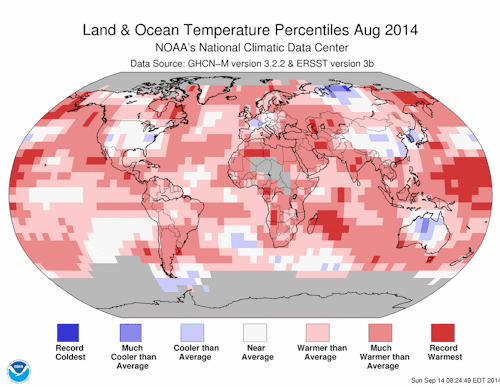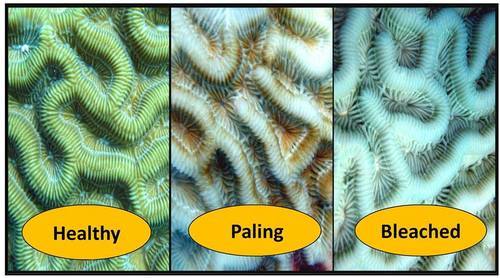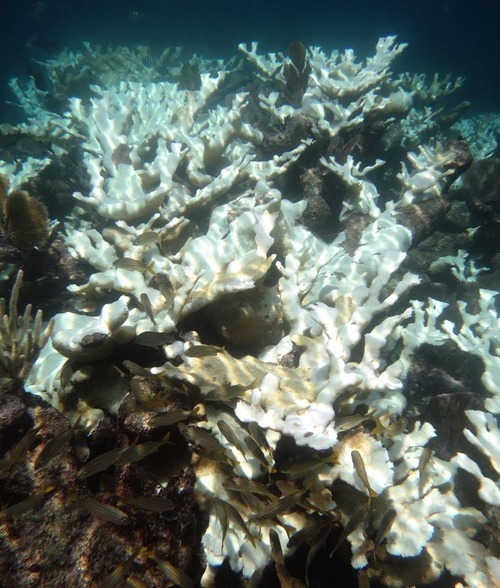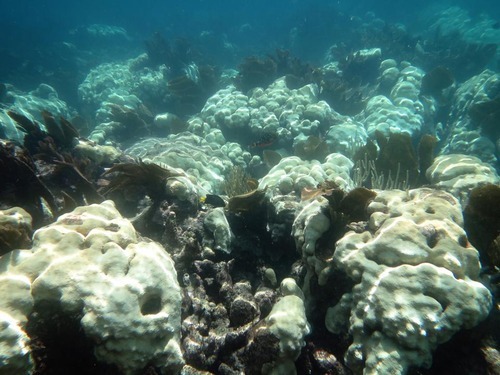This summer’s water temperatures were incredibly high, especially around the Caribbean reefs and the Florida Keys reef tract. Sadly, I was able to witness the overwhelming bleaching of thousands of corals in that area.
NOAA reported that this past July and August broke records for the hottest months since global temperature records began in 1880!
One of my old colleagues at NOAA said that temperatures have been over 30C for over a month! Some temperature loggers in monitored Acropora palmata plots have gotten as high as 32.5C! Keep in mind that the optimal water temperature for coral growth is between 23 and 25C.

(Source: NOAA)
- What is coral bleaching?
The vast majority of reef-building corals have a mutually beneficial, symbiotic relationship with a microscopic algae called zooxanthellae. That algae lives within the cells of the coral, and it helps the coral survive. Zooxanthellae provide the coral with many essential nutrients that are then used by the coral to build its calcium carbonate skeleton. In return, the coral provides protection for the algae as well as the compounds necessary for photosynthesis. It is impossible for the coral to survive too long without its algae.

(Zooxanthellae give the corals their distinctive colors. If expelled, the coral will turn white. Source: Florida Keys BleachWatch Program)
Corals are very sensitive animals. For them to thrive, the water must be warm but not too warm, relatively clear, saline, nutrient-poor, and be in shallow waters to get plenty of sunlight. Any small change in these requirements and the corals will likely get stressed. They may tolerate changes, but not for too long.


(Patches of Elkhorn coral, Acropora palmata, at Grecian Rocks in the Upper Keys, are heavily bleached. Photo credit: Dana Williams, NOAA)
When corals get stressed by abnormal conditions, they will expel the zooxanthellae, and hence this will leave them looking completely white (the calcium carbonate skeleton of corals is white, and the coral tissue itself is transparent). Mass expulsion of zooxanthellae is called coral bleaching.
Once they bleach, the corals are basically starving themselves. If conditions return to normal relatively quickly, corals can regain their zooxanthellae and survive. But the stress occurred also may lead to decreased productivity and growth, and increased likelihood to disease. If the stressful factor remains constant for quite some time, it decreases the chance of corals to bounce back and recover.

(Orbicella annularis bleaching as well in the Upper Keys. Photo credit: Dana Williams, NOAA)
- Will the corals recover?
Only time will tell. Temperatures have been gradually falling since the end of August, but we have yet to determine if they have been decreasing quickly enough. It will take months to fully survey and determine the extent of the bleaching, as well as to document incidences of disease and mortality due to this heat-stress.

(This is the same patch of Acropora palmata as pictured above, at Grecian Rocks in the Upper Keys, but looking very healthy. Photo was taken a few years ago. Credit: Dana Williams, NOAA)
Scientists at the Mote Marine Laboratory are already considering this summer as being one of the worst on record for corals in the Caribbean and Florida. The last major bleaching event occurred in 2005, with Hurricane Wilma thankfully sweeping the area and bringing in much cooler temperatures, but scientists are already saying this year’s bleaching event is much worse and not like anything they’ve ever seen.
This year, no hurricane ran through the area, and temperature logs recorded around the Florida Keys have been reported to be the highest on record. Climate change is obviously a reality, and coral reefs around the globe are suffering the consequences of an increasingly hot and acid ocean.
cedes464 liked this
merciresolution liked this
verybluebirdy liked this
wild-oceans liked this
the0fool reblogged this from marine-conservation
thewinchestersbabe liked this
 thirdwavehippy-blog liked this
thirdwavehippy-blog liked this noahfromthesea reblogged this from marine-conservation
iwillnotlosemyself reblogged this from marine-conservation
noahfromthesea liked this
savethegbr-blog-blog liked this
tbhfucklukehemmings reblogged this from marine-conservation
clutchingawesome reblogged this from marine-conservation
clutchingawesome liked this
balisongbutch reblogged this from marine-conservation
yume-oibito reblogged this from marine-conservation
 asquirrel liked this
asquirrel liked this vaderztaterz reblogged this from marine-conservation
 fromtheskytothecenter reblogged this from marine-conservation
fromtheskytothecenter reblogged this from marine-conservation cacthigh reblogged this from marine-conservation and added:
i feel sick
dream-caught-unicorn reblogged this from marine-conservation
dream-caught-unicorn liked this
marinebiologysource reblogged this from marine-conservation
myowndefinitionofbeautiful liked this
lauren-trahan liked this
renamon reblogged this from marine-conservation
 welliguessillberoger reblogged this from marine-conservation
welliguessillberoger reblogged this from marine-conservation elle-bird reblogged this from marine-conservation
animal-planets reblogged this from todropscience
 helene1606 liked this
helene1606 liked this epiphany-felicity reblogged this from todropscience
marinegeekspeak liked this
fernguly liked this
lirio-dendron reblogged this from marine-conservation
positivegayacknowledgment liked this
volk-morya reblogged this from marine-conservation
 magikarpballoons reblogged this from marine-conservation
magikarpballoons reblogged this from marine-conservation  magikarpballoons liked this
magikarpballoons liked this rosary-garden liked this
marine-conservation posted this
- Show more notes